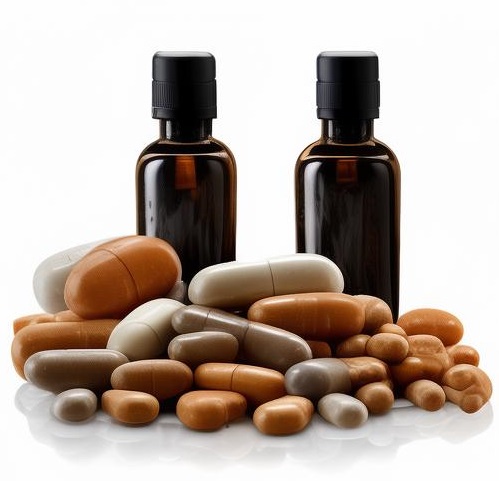Sexual desire is an instinctive need of human beings. For men, sexual health is the focus of attention. With the accelerated pace of life and increased pressure, some men have experienced a decrease in sexual desire.
In order to improve this situation, various male sexual desire enhancement drugs have emerged on the market. This article will discuss male sexual desire enhancement drugs, explore their scientific principles, current status and the importance of rational view.
Causes of Male Libido Loss
Male libido loss, also known as low libido or decreased sexual desire, can be caused by a variety of factors, including physiological, psychological, lifestyle, and environmental factors. Here are some common causes:
1. Physiological Factors
As men age, their testosterone levels may gradually decrease, which means that the male hormone level decreases, leading to a decrease in libido. Obesity, sleep apnea, thyroid problems, etc. may also lead to a decrease in libido.
Chronic diseases such as diabetes, heart disease, high blood pressure, and kidney disease may affect libido. There are also certain medications, such as antidepressants, antihypertensive drugs, sedatives, etc., which may reduce libido.

2. Psychological Factors
- Stress and anxiety: Pressure from work, family, finances, etc. may lead to decreased sexual desire.
- Emotional problems: Emotional problems such as depression, sadness, anger, etc. may affect sexual desire.
- Psychological sexual problems: Psychological problems such as sexual trauma, sexual fear, sexual aversion, etc. may lead to decreased sexual desire.
3. Lifestyle Factors
Bad habits such as smoking, alcoholism, and drug abuse may affect sexual desire. Long working hours, lack of rest, and insufficient sleep may lead to decreased sexual desire. Malnutrition and unbalanced diet may affect sex hormone levels and sexual desire.
4. Emotional and Relationship Factors
If the relationship between husband and wife is not harmonious, poor communication, emotional alienation, lack of trust, etc. may lead to decreased sexual desire. Sexual problems between sexual partners, such as insufficient sexual skills and low sexual satisfaction, may also affect sexual desire.
5. Age Factors
As you age, your libido may naturally decrease, which is a normal physiological change.
Understanding the causes of decreased libido is essential to finding appropriate treatment and management strategies. If decreased libido persists, it is recommended to consult a doctor or professional sexual health counselor.
The Science of Male Libido Enhancement Drugs
The working mechanism of male libido enhancement drugs usually involves the following aspects:
1. Hormone Replacement Therapy
Testosterone is the main male sex hormone and is essential for maintaining sexual desire and normal sexual function. Testosterone replacement therapy increases the level of male hormones in the body by supplementing testosterone, thereby enhancing sexual desire. This therapy is suitable for men with low testosterone levels and can be taken orally, by injection, patch or gel.
Testosterone replacement therapy directly acts on the sexual center of the brain by increasing the level of testosterone in the body, enhancing sexual impulses while promoting the development and maintenance of reproductive organs.
2. Phosphodiesterase Inhibitors
Drugs such as sildenafil (Viagra), tadalafil (Cialis), and vardenafil (Levitra): These drugs were originally developed to treat erectile dysfunction (ED), but they may also indirectly increase sexual desire.
These drugs improve erections by inhibiting phosphodiesterase 5 (PDE5), increasing nitric oxide (NO) levels in the corpus cavernosum of the penis, leading to smooth muscle relaxation and vasodilation. Improved erectile function may help increase sexual confidence and desire.
3. Central nervous system stimulants
Some drugs can directly stimulate the sex center in the brain, thereby increasing sexual desire. These drugs may increase sexual desire by increasing the levels of certain neurotransmitters in the brain, such as dopamine and norepinephrine.
4. Herbs and Other Supplements
Some herbal remedies and other supplements are used to enhance sexual desire. These supplements often contain natural ingredients that claim to increase libido or improve sexual function. Although their scientific basis may not be well-documented.

These treatments may work through a variety of mechanisms, including hormone balance, improved blood circulation, and overall body conditioning.
It is important to note that the use of libido-enhancing drugs should be done under the guidance of a doctor, as they may have side effects and interact with other medications.
In addition, decreased libido may be caused by a variety of factors, including psychological, physiological, and lifestyle factors, so the underlying cause should be evaluated and treated before considering medication.
Common Side Effects of Male Libido Enhancement Drugs
Male libido enhancement drugs may come with a range of side effects, which may vary depending on the type of drug, dosage, and individual constitution.
It is important to note that some libido enhancement drugs, especially those illegal products with undeclared ingredients, may pose more serious health risks. Here are some common side effects:
Cardiovascular System
These side effects are usually related to the drug’s direct effects on the cardiovascular system, especially those that affect blood vessel dilation and heart function.
- Palpitations or rapid heartbeat: Some drugs may affect the heart’s rhythm or increase the heart’s workload.
- High blood pressure: Some drugs work by dilating blood vessels to enhance erectile function, but they may also increase blood pressure.
- Angina or chest pain: Vasodilation may increase the heart’s oxygen demand, which may cause angina in patients with heart disease.
- Irregular heartbeats: Drugs may affect the heart’s electrical properties.
Digestive System
These side effects may be related to the drug’s irritation of the digestive system or its regulation of intestinal function.
- Nausea and vomiting: The drug may irritate the gastric mucosa or affect the neural regulation of the digestive system.
- Diarrhea or constipation: The drug may affect intestinal motility or water balance.
Nervous System
These side effects are often related to the drug’s direct or indirect effects on the central nervous system.
- Headaches: Vasodilation may lead to increased blood pressure in the head, causing headaches.
- Dizziness or lightheadedness: The drug may affect blood pressure, leading to changes in blood flow to the brain.
- Sleep problems: The drug may affect neurotransmitter levels, which in turn may affect sleep patterns.
- Psychiatric symptoms: The drug may affect mood-regulating neurotransmitters, such as dopamine and serotonin.
Reproductive System and Sexual Function
These side effects are related to the drug’s effect on sex hormone levels or the mechanisms that regulate sexual function.
- Prolonged or abnormal erections: Some drugs overstimulate the erectile response.
- Abnormal increase or decrease in sexual desire: The drug may affect hormone balance or neurotransmitter levels.
Other Common Side Effects
These side effects may be related to the combined effects of the drug on the vascular system, muscle tissue, and visual system.
- Facial flushing or fever: Vasodilation leads to increased blood flow to the face.
- Nosebleed or nasal congestion: The drug may affect the blood vessels of the nasal mucosa.
- Muscle pain or back pain: The drug may cause muscle tension or affect muscle metabolism.
- Visual abnormalities: The drug may affect blood circulation or nerve conduction in the retina.
The side effects of libido-enhancing drugs are usually due to the direct effects of the drugs on multiple systems of the body, such as the cardiovascular, digestive, nervous, and reproductive systems.
The incidence and severity of these side effects vary depending on the type of drug, dosage, individual constitution, and health status of the user. Therefore, before using these drugs, you should consult a doctor and use them under the guidance of a doctor to reduce the risk of side effects.
Rationally Look At Male Libido Enhancement Drugs
With the opening of sexual concepts, the market demand for male libido enhancement drugs is growing. Various products emerge in an endless stream, and advertising is overwhelming.
Driven by profit, some companies produce substandard products and even add banned ingredients, which poses a safety hazard to consumers.
Some consumers blindly pursue drug efficacy and abuse libido enhancement drugs, leading to drug dependence, adverse reactions and other problems. Rationally looking at male libido enhancement drugs requires consideration from multiple angles:
- Understand the effects and side effects of drugs: Before considering the use of libido-enhancing drugs, you should fully understand the drug’s mechanism of action, possible side effects, and interactions with other drugs.
- Assess the necessity: Decreased libido may be caused by a variety of factors, including physiological, psychological, and lifestyle factors. Before considering drug enhancement, you should first evaluate whether the use of drugs is necessary.
- Pay attention to individual differences: Everyone’s physiological and psychological conditions are different, and their reactions to libido-enhancing drugs will also be different. You should not blindly follow the trend or overly rely on the experience of others.
- Avoid abuse: Libido-enhancing drugs should not be abused at will. Long-term or inappropriate use may lead to dependence or other health problems.
- Consider overall health: Libido-enhancing drugs may only solve superficial problems and ignore the root causes of sexual dysfunction. Overall health, including mental health, physical health, and lifestyle, should be considered comprehensively.
- Maintain rational expectations: Libido-enhancing drugs are not a panacea, and they may not meet all expectations. Maintain rational expectations and don’t expect drugs to completely change the quality of your sex life.
- Pay attention to safety: choose drugs that have undergone rigorous clinical trials and market verification, and avoid using unverified or unknown products.
- Spouse participation: Sexual life is a matter for both spouses, and the use of libido-enhancing drugs should also take into account the feelings and opinions of the partner and participate in the decision-making process together.
- Continuous monitoring and evaluation: During the use of libido-enhancing drugs, physical reactions and side effects should be continuously monitored, and the treatment plan should be adjusted if necessary.
Through the above methods, you can view and use male libido enhancement drugs more rationally, ensuring that while pursuing sexual happiness, you can also maintain your own health and safety.
Frequently Asked Questions and Answers
Q1: What are male libido enhancement drugs?
Male libido enhancement drugs refer to drugs used to increase male libido or improve sexual function, including prescription and over-the-counter drugs, which may include hormone replacement therapy, phosphodiesterase inhibitors, etc.
Q2: Are male libido enhancement drugs effective?
For some people, these drugs may be effective, but the effect varies from person to person. They may help increase libido or improve erectile function, but they are not effective for everyone.
Q3: What are the side effects of male libido enhancement drugs?
Common side effects include headaches, facial flushing, indigestion, high blood pressure, palpitations, muscle pain, etc. Some drugs may also cause serious cardiovascular events.
Q4: How to use male libido enhancement drugs safely?
Safe use includes: use under the guidance of a doctor, follow the doctor’s advice, do not exceed the dose, do not mix with other drugs, and have regular health checks.
Q5: Who should use male libido enhancement drugs?
It is usually recommended for men with decreased libido and diagnosed with sexual dysfunction by a doctor. But not everyone is suitable for use, such as patients with cardiovascular disease should be cautious.
Q6: Can male libido enhancement drugs be used with alcohol?
Not recommended. Alcohol may increase the risk of side effects, especially cardiovascular side effects.
Q7: Can male libido enhancement drugs lead to dependence?
For some drugs, especially those that affect hormone levels, dependence may occur. After long-term use, the body may adapt to the effects of the drug.
Q8: Do male libido enhancement drugs affect fertility?
Most libido enhancement drugs do not directly affect fertility, but some drugs may affect sperm quality and quantity.
Q9: Are there any natural ways to increase male libido?
Yes. Improving lifestyle (such as increasing exercise, improving diet, reducing stress), couple communication, and psychological counseling are all natural and effective methods.
Q10: What should I do first if I have a loss of libido?
If you experience a loss of libido, you should first consult a doctor to rule out any underlying health problems. The doctor may recommend lifestyle changes or other treatments.
Conclusion
Drugs for enhancing male libido continue to develop under the dual impetus of scientific research and market demand.
However, while pursuing sexual happiness, consumers should look at these drugs rationally, pay attention to safety, follow the doctor’s advice, and never blindly pursue drug efficacy.
Only by improving living habits, adjusting psychology, and treating both the symptoms and the root causes can we truly achieve a harmonious sexual life.
